Property companies in Hong Kong are concerned about a proposed change to accounting rules under the Science-Based Targets initiative (SBTi), which they say will make meeting net-zero targets almost impossible for the building and construction sector in most of Asia.
To continue reading, subscribe to Eco‑Business.
There's something for everyone. We offer a range of subscription plans.
- Access our stories and receive our Insights Weekly newsletter with the free EB Member plan.
- Unlock unlimited access to our content and archive with EB Circle.
- Publish your content with EB Premium.
SBTi, which verifies decarbonisation targets in line with the Paris Agreement target of capping global warming at 1.5°C, may amend their rules to allow real estate firms to report only Scope 2 electricity emissions reductions in the places where they consume energy – an approach known as location-based accounting – in the latest draft of its building sector guidance.
This could make compliance prohibitively difficult in Asian territories with fossil fuel-based electricity grids, according to a group of property firms lobbying against the revision. Hong Kong’s electricity grid is mainly powered by coal, natural gas and oil.
SBTi’s proposed rule change could mean it would not recognise real estate firms’ electricity emissions reductions through market-based carbon reduction programmes, such as buying renewable energy certificates (RECs) and clean energy power purchase agreements.
The rule change is aimed at nudging real estate firms to focus more on energy reduction and efficiency rather than renewables procurement to curb emissions.
“
We do understand that – in the context of renewable energy procurement – SBTi must contend with concerns related to double counting or inflated claims of emissions reductions. We share these concerns.
A statement from Hong Kong real estate companies

John Haffner (far right) speaking on a panel on corporate decarbonisation at the ReThink sustainability conference in Hong Kong on 14 September 2023. Image: ReThink
Speaking at a panel discussion in Hong Kong last Thursday, John Haffner, deputy director for sustainability at property developer Hang Lung Properties, said his company had been planning to buy renewable energy as a major part of its net-zero strategy, but SBTi’s revised sectoral guidance would mean the firm “would not be able to account for renewable energy procurement”.
Energy efficiency measures alone would not be sufficient for the emissions reductions needed to achieve net-zero emissions by 2050 in Asia, he said.
“We have concerns around that. We know that others share those concerns as well,” he said at the ReThink sustainability event at the Hong Kong Convention & Exhibition Centre this month.
Hang Lung Properties became the first real estate company in Hong Kong and mainland China to receive approval by SBTi for its near- and long-term emissions reduction targets in line with the SBTi Net-Zero Standard at the start of this year. SBTi’s proposed guidelines on Scope 2 reporting could affect progress towards achieving those targets.
Hang Lung Properties is one of a group of companies including Sino Group, New World Development and Swire Properties that have taken SBTi to task about the proposed new rules, backed by the World Green Building Council, a non-profit that supports green building councils around the world.
An executive representing the real estate firms said in an email shared with Eco-Business that the group agrees that energy efficiency should be the priority, but SBTi should continue to give firms the option of market-based reporting.
In jurisdictions like Hong Kong and mainland China that lack “a clear and sufficiently aggressive” near-term grid decarbonisation pathway, renewable energy procurement is key to developing renewable energy supply, he said.
The proposed new rules would also mean that real estate firms in Hong Kong and mainland China would lack an incentive to pursue market-based renewable energy arrangements, and investment in renewable energy would be slower as a result, he said.
It may also discourage companies from setting science-based targets at all, since they would have difficulty convincing their boards of the feasibility of the decarbonisation pathway required based on energy efficiency alone, he said.
Inflated claims and double-counting
Concerns over allowing firms to procure renewables as the primary means of reaching Paris-aligned net-zero targets partly stem from a perceived over-use of RECs. A study in Nature Climate Change found that RECs threaten the integrity of science-based targets, as RECs are unlikely to lead to additional renewable energy production.
Hong Kong real estate firms are major buyers of RECs from mainland China as a means of working towards net-zero targets. Under the proposed new SBTi rules, real estates firms could only buy RECs in Hong Kong, where there is a limited supply, to meet science-based targets.
The buildings sector contributes to 37 per cent of global carbon emissions, with indirect emissions from electricity and heat consumption accounting for three times the sector’s direct emissions.
The group representative said that Hong Kong real estate firms understand concerns over double-counting and inflated emissions reduction claims with renewables procurement, but suggest adding further guidance to ensure good governance rather than eliminate market-based reporting altogether.
Among the group’s suggestions to “ensure the credibility” of market-based reporting for renewables is for firms to be required to disclose their energy efficiency targets as a subset of their overall SBTi targets, to ensure that this priority is maintained alongside procured renewable energy.
Companies should also be required to prove “exclusive ownership” of any renewables instruments they buy to avoid double-counting, and that procurement is aligned with the principles of RE100, an initiative for firms committed to buying only renewable electricity.
The World Green Building Council said it has provided feedback to SBTi and welcomed an extended timeline to address the feedback received.
SBTi said that mandatory location-based accounting for Scope 2 emissions is only one proposal among a number suggested, and that all consultation feedback will be taken into account when developing the final guidance, which will be released “in the coming months”.










